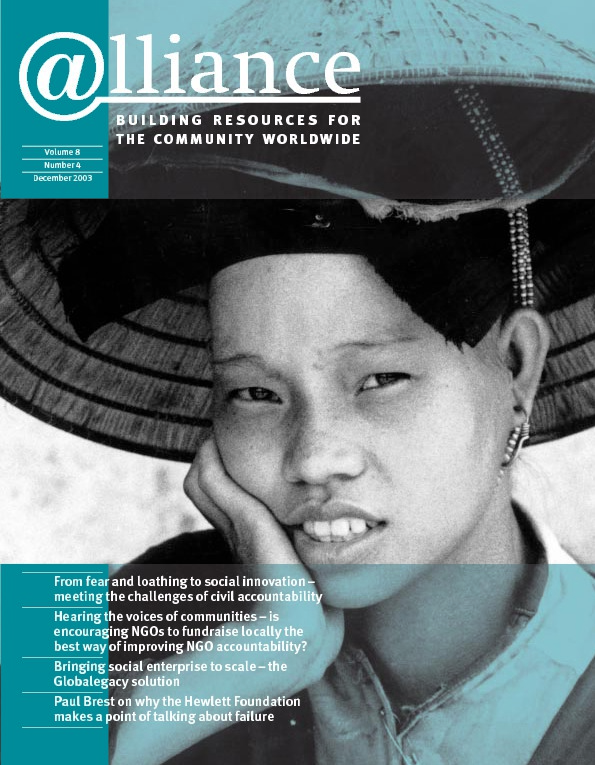We funders are all striving to make a difference, aren’t we? But we have to do it through others. What would happen if we allowed NGOs to control how funds are used and trusted them to make the difference? Under Zurich Financial Services Community Trust’s new capacity-building programme for its South India partners, a grant is agreed for at least three years then the NGO is left to decide how best to use it.
Zurich has run its South India Programme for the last nine years. Its primary aim is to build the capacity of partner NGOs through a combination of funding, assignments by our UK staff and network meetings between all partners involved. We have measured the programme’s success using social accounting techniques,[1] but despite great feedback from our stakeholders we only had anecdotal evidence of success in capacity-building. We were also learning important lessons about the challenges faced by southern NGOs, such as:
- managing short funding cycles;
- the time required to devise and report on projects that meet donor approval;
- the complexities of managing a programme while dealing with restricted funding;
- finding funds for core costs.
Using techniques outlined in From the Roots Up,[2] we worked with our partner NGOs to design a solution. We brought many ideas to the table and explored many previous experiments in measuring capacity. What we came up with was something just a bit different.
We measure capacity once a year by asking staff members to rate their NGOs against agreed indicators in seven areas: management, HR and training, communications and PR, finance, service delivery, advocacy, and research, development and documentation.[3] Staff discussions are facilitated using visual techniques by another member of the Zurich capacity-building group in South India, who also does a documentation check to gather basic information. Five of our nine partners are involved in this initiative. The process takes one day, then a couple of hours to record. The record gives us a baseline measurement of capacity. The NGO then calculates its core costs.[4] We agree a funding level of 10–50 per cent of this figure, set a minimum funding track of three years, then let the NGO choose how to spend the money.
It is this act of trust that sets our concept apart. The idea is to free the NGO to make choices on how to improve its own capacity, decision making being one of those capacities. It is designed to give NGOs flexibility to respond to the opportunities and challenges they face rather than trying to work in a straight jacket. We work closely with them and provide focused support through programme manager visits, Zurich staff assignments and a partners group, but we do not place any restrictions on the funding.
While we recognize that capacity may not be built in three years, annual measuring against the baseline measurement of capacity should give us all better information, showing us which areas are weakest, where progress is being made and where we can deliver support to best effect.
So what’s the experience so far?
Positives
Our relationships with partners have greatly improved and moved to a new level of openness. All the India Programme’s resources are now aimed at capacity-building, which feels right and productive, and results in a better use of everyone’s time. It has clarified what the India Programme means by capacity-building and made sure that understanding and ownership occur on both sides of the relationship.
Negatives
We still do not know how to say when capacity will be built and recognize that the nature of the beast is cyclical. Understanding of capacity changes as capacity itself improves. The measure is too blunt to give us really consistent and useful data, and is also subject to facilitator interpretation. It is hard to attribute impact, and capacity changes are rarely attributable to one source: can we claim all improvements? A percentage of them all? How do we prove our inputs are the driver for change?
So there is still a long way to go and we are working together to find solutions to some of these issues. Most importantly, we still need absolute proof that this idea does build long-term capacity, but initial signs are good and we would be happy to share details of this pilot phase with all those tackling similar issues. The key is that we are working together and have the will to find a solution. Overall the change in funding has been a major leap forward for the Programme and the challenge now is to refine the idea and incorporate the learning from the first round of measurement in 2002.
1 Social accounting was developed by the New Economics Foundation to identify and obtain stakeholder opinions through a controlled and recurring process.
2 P Gubbels and C Koss (2000) From the Roots Up: Strengthening organizational capacity through guided self-assessment (2nd ed). Oklahoma City: World Neighbors.
3 The management indicators, for example, include: services and systems, planning and crisis management, vision and leadership, monitoring and evaluation, and day-to-day delivery.
4 Using guidelines developed by the UK-based Association of Chief Executives of Voluntary Organisations.
Ali King is India Programme Manager at the Zurich Community Trust. She can be contacted at ali.king@uk.zurich.com





Comments (0)